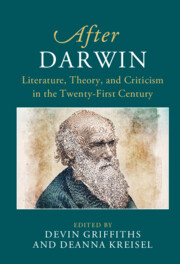Book contents
- After Darwin
- After Series
- After Darwin
- Copyright page
- Contents
- Figures
- Contributors
- Chapter 1 Introduction
- Part I Environments after Darwin
- Chapter 2 Darwin after Nature
- Chapter 3 Darwin and Animal Studies
- Chapter 4 Darwin’s Birdsong
- Chapter 5 Darwin and the Anthropocene
- Part II Differences after Darwin
- Part III Humanism after Darwin
- References
- Index
Chapter 5 - Darwin and the Anthropocene
from Part I - Environments after Darwin
Published online by Cambridge University Press: 01 December 2022
- After Darwin
- After Series
- After Darwin
- Copyright page
- Contents
- Figures
- Contributors
- Chapter 1 Introduction
- Part I Environments after Darwin
- Chapter 2 Darwin after Nature
- Chapter 3 Darwin and Animal Studies
- Chapter 4 Darwin’s Birdsong
- Chapter 5 Darwin and the Anthropocene
- Part II Differences after Darwin
- Part III Humanism after Darwin
- References
- Index
Summary
At the heart of Charles Darwin’s place in environmental thought is a crucial tension: on the one hand, his work thoroughly dismantles the arguments for human exceptionalism, and dramatically minimizes the significance of the human species within the vast unfolding of geological and evolutionary history. On the other hand, his theorization of ecological interactivity laid the groundwork for conceptualizing the ways in which (some) human beings were having a massively outsized and growing impact upon the Earth’s ecosystems, including on the biosphere itself. As this chapter shows, questions about the proper scalar framework with which to understand the place of humanity and the scope of human agency within the natural order—questions which Darwin posed in profound and groundbreaking ways—continue to swirl around the Anthropocene concept and contemporary conversations about how to address the many interconnected ecological crises we face.
- Type
- Chapter
- Information
- After DarwinLiterature, Theory, and Criticism in the Twenty-First Century, pp. 57 - 70Publisher: Cambridge University PressPrint publication year: 2022
- 1
- Cited by

